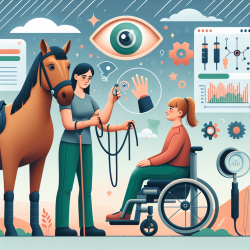The landscape of rehabilitation psychology and neuropsychology has undergone a seismic shift due to the COVID-19 pandemic. Telehealth has emerged as a vital tool in ensuring continuity of care, particularly in the fields of rehabilitation psychology and neuropsychology. This blog post explores key insights from the research article "Telehealth in Rehabilitation Psychology and Neuropsychology" and offers practical advice for practitioners aiming to enhance their skills or delve deeper into this burgeoning field.
The Power of Telehealth in Rehabilitation
Telehealth isn't a new concept, but the pandemic accelerated its adoption, proving its efficacy and sustainability. The article underscores several critical points:
- Telepsychology has been validated for various conditions, including depression, PTSD, anxiety, and mild cognitive impairment.
- Remote cognitive rehabilitation has shown promising results for veterans with mild TBI and older adults with cognitive impairments.
- Teleneuropsychology enhances service access and reduces healthcare costs while maintaining high patient satisfaction.
Implementing Telehealth: Practical Tips for Practitioners
For those looking to implement or improve their telehealth services, the following strategies are essential:
- Communication: Maintain close communication between administrative staff, patients, caregivers, and providers.
- Training: Ensure all team members are trained in telehealth platforms and workflows.
- Screening: Develop clear guidelines for identifying patient access issues, technology capabilities, and clinical appropriateness.
- Backup Plans: Have contingency plans in place to handle technical issues or other disruptions.
Challenges and Considerations
While telehealth offers numerous benefits, it also presents challenges that must be addressed:
- High-risk populations, such as those with substance abuse or suicidality, require careful consideration and risk assessment.
- Remote neuropsychological evaluations may be limited in scope and diagnostic accuracy.
- Provider competency in using telehealth platforms is crucial for effective service delivery.
Future Directions
The future of telehealth in rehabilitation psychology and neuropsychology looks promising. Continued research and development will be essential in refining telehealth practices, ensuring sustainable billing practices, and integrating novel technologies to enhance patient care.
To read the original research paper, please follow this link: Telehealth in Rehabilitation Psychology and Neuropsychology.










